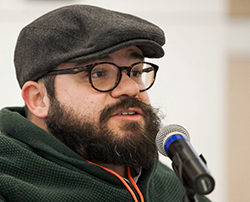Diversity and Inclusion
The Ethics of Passing and Disability Disclosure in Higher Education With Joseph A. Stramondo, part of the (Dis)courses: Interdisciplinary Disability Dialogues Spring 2022 Series
April 19, 2022 at 5:00pm – 6:30pm EDT
Virtual (See event details)
This event has already occurred. The information may no longer be valid.

This talk will explore if or when one has an ethical duty to disclose their disability as a faculty member.
It will explore such topics as: Who do you have a responsibility to disclose your disability to and why? Do faculty specifically have an ethical obligation to disclose their disability that is entailed by their role? How do you judge whether the ethical reasons you may have for disclosure are outweighed by your own self-interest to avoid the harms of disability stigma and discrimination by passing? Does one have an obligation to disclose all disabilities or is there reason to disclose some disabilities more than others?
Ultimately, I will use the methodology of narrative identity and ethics, as developed by Hilde Lindemann, to argue that there are some ethically salient reasons for some faculty members to disclose their disability some of the time, but this duty is not absolute and can be outweighed by other considerations. The ethical reasons for disclosure arise from the notion that a person’s identity is never a private matter, but always relational in nature because human agency is relational. That is, a person is always constrained by others when making the choices that express who they are.
However, these relational constraints are not permanent or static, but can be tightened or loosened, allowing for lesser or greater self-determination in matters of identity. Constraints placed on the identity and agency of those with less power are loosened when those with more power open up the social space necessary for acting according to a chosen personal identity. One effective way to open up this social space for disability identity to flourish is for you yourself to identify as disabled. To translate this argument into the institutional structures of higher education, faculty, especially permanent, tenured faculty, sometimes have an obligation to disclose their own disability identity to create the social space for other disabled people with less institutional power to flourish within the academy.
Dr. Stramondo (he/him/his) is an Associate Professor of Philosophy and Director of the Institute for Ethics and Public Affairs at San Diego State University. He holds graduate degrees in both philosophy and public policy studies and his current research focuses on the intersection of biomedical ethics and philosophy of disability. Namely, he is concerned with how bioethics can be reframed by centering the lived experiences of disability as a crucial source of moral knowledge that should guide clinical practice, biomedical research, and health policy. He has published scholarship on topics ranging from informed consent procedures to reproductive ethics to pandemic triage protocols to assistive neurotechnology. His work appears in venues such as The Hastings Center Report, Social Theory and Practice, the Kennedy Institute for Ethics Journal, Theoretical Medicine and Bioethics, Utilitas, The International Journal of Feminist Approaches to Bioethics, and more. He is devoting most of his present research effort to developing a co-authored book manuscript, under contract with Routledge, that will address the ways in which the field of bioethics fails to address the moral salience of the social categories of gender, race, disability, and sexuality. In addition to his teaching and research, Dr. Stramondo is also currently serving as the co-President of the Society for Disability Studies.
Hosted by the Office of Interdisciplinary Programs and Outreach at the Burton Blatt Institute and Wordgathering: A Journal of Disability Poetry and Literature, the series “(Dis)courses: Interdisciplinary Disability Dialogues” returns this semester with four exciting conversations—with luminaries who are engaged variously with many forms of innovative and intersectional Disability cultural work.
Each of our four online events will include American Sign Language (ASL) interpretation, live captioning, image descriptions, and an opportunity for registered Zoom webinar participants to engage with the featured presenter and discussant. All four events will also be recorded and made publicly available, online. Post-production, each of the videos will include ASL interpretation and edited/polished captions, an accompanying transcript, and a summary of online resources of interest and relevance—all accessible, free, and open to the public.
The Spring 2022 (Dis)courses Series is sponsored by the Office of Interdisciplinary Programs and Outreach (OIPO) at the Burton Blatt Institute (BBI) at Syracuse University and Wordgathering: A Journal of Disability Poetry and Literature, with very special thanks to the Syracuse University Libraries, and with additional support from the Center on Disability and Inclusion, the Central New York Humanities Corridor Health Humanities Working Group (Medicine, Disease, Disability, and Culture), the Consortium for Culture and Medicine, Cultural Foundations of Education, Dept. of Biology, Dept. of English, Dept. of History, Dept. of Women’s and Gender Studies, the Disability Cultural Center, Disability Studies, The Graduate School, Hendricks Chapel, Information Technology Services, the Intergroup Dialogue Program, La Casita Cultural Center, the LGBTQ Resource Center, LGBTQ Studies, the Renée Crown University Honors Program, the School of Education, and the Syracuse University Humanities Center.
This event was published on February 16, 2022.
Event Details
- Category
- Diversity and Inclusion
- Region
- Virtual
- Open to
- Public
- Cost
- Free and open to the public.
- Group
- College of Law
- Organizer
- Burton Blatt Institute
- Contact
- Office of Interdisciplinary Programs and Outreach
oipo@syr.edu
315-443-2156
- Accessibility
- CART,
- ASL Interpretation,
- Captioning
- Contact Office of Interdisciplinary Programs and Outreach to request additional accommodations
